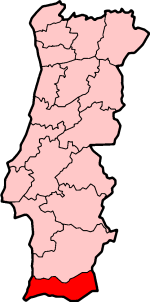Faro, Portugal
|
|
ArcoMuralhaFaro.JPG
CamaraMunicipalFaro.JPG
ErmidaSrPeCruzFaro.JPG
EstatuaDAfonsoIIIFaro.JPG
GovernoCivilFaro.JPG
IgrejaSeFaro.JPG
IlhadeFaro.JPG
MarinaFaro.JPG
MisericordiaFaro.JPG
Faro is a city, the capital of the district of Faro and of the Algarve province, in southern Portugal. The Algarve province and the Faro district cover the same territory.
Faro is the administrative centre for the whole of the Algarve region. The city has about 55,000 inhabitants. Most of its present attractive older buildings were constructed after the disastrous earthquake of 1755 and the earlier one of 1532.
The Ria Formosa lagoon attracted human occupants from the Palaeolithic age until the end of pre-history. During that time a settlement grew up – Ossonoba – which was an important town during the period of Roman occupation and, according to historians, the forerunner of present-day Faro. From the 3rd century onwards and during the Visigothic period it was the site of an Episcopal see. With the advent of Moorish rule in the 8th century Ossonoba retained its status as the most important town in the southwest corner of the Iberian Peninsula. In the 9th century it became the capital of a shortlived princedom and was fortified with a ring of defensive walls. At this time the name Santa Maria began to be used instead of Ossonoba. Later on the town was known as Harune, whence its current name, Faro. After the Moorish period, the Moors were defeated by the forces of the Portuguese King Afonso III during the 13th century. With the decline of the importance of the city of Silves this town took over the role of administration of the Algarve area.
The Earl of Essex sacked the town in 1596 and seized the library of the Bishop of Faro. These books were later donated to the University of Oxford, becoming part of the Bodleian Library.
During the 500 years of Moorish occupation there were some Jewish inhabitants in Faro who were busily writing copies of the Old Testament.
Faro is also the home of the Ria Formosa lagoon, a nature reserve of over 170 square kilometres and a stopping place for hundreds of different birds during the spring and autumn migratory periods. The beach is almost seven kilometres from the city, and is a long sandy spit reached by crossing a bridge.
The city has a state university (the University of the Algarve), an international airport and a seaport.
Its 30,000-seater stadium called Estádio Algarve, shared by the neighboring cities of Faro and Loulé, was one of the sites of Euro 2004. It currently stands empty, but locals hope that a newly created local side, Algarve United, will quickly progress up the league ladder and be able to take over the stadium themselves.
Climate and Tourism
Although most people think that the Algarve is a sunny place all year round, it has four well-defined seasons in terms of temperature and rainfall. The lowest temperature in winter never goes below 0ºC, and the hottest days in summer reach 40ºC. The warm climate, the beaches and the sunny weather, makes Faro district a very popular summer resort. Domestic tourists from Portugal and thousands of other european tourists from the outside, such as from Great Britain, Sweden, Denmark, Netherlands and Russia arrive in Algarve during June, July and August.
See also
External links
- Faro's Municipality (http://www.cm-faro.pt)
- Algarve's University (Faro) (http://www.ualg.pt)ca:Faro

